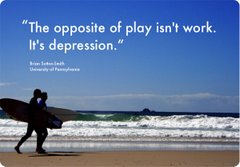Saturday, February 10, 2007
Sunday, January 14, 2007
Glass House Denver
1. We placed a site sign at the construction site directing people to a website (not the one that exists now).
2. At that site, we ran a short slideshow of what I would call benefit pictures - no renderings of a pool, just a guy sitting by a pool.
3. Once the slideshow ended, we offered people a chance to "get on the list" for more information.
4. When we had permission from these people, we began updating them on our progress once a month, including revealing in more detail each feature of the building.
5. By the time we began the next step, over 5,000 people (I can't remember the exact number) had signed up (85% saying they were recommended by a friend.)
6. About 500 of those people had come by our office and REALLY expressed interest/granted permission.
7. We had about 45 cocktail parties for those people, about 15 at a time, at a restaurant in our neighborhood. In essence, we invited them in for drinks. We brought no collateral. No models. Instead, we just spent time with them. Answered their questions. Filled them in on the details that mattered to them.
8. Then we created a private website for those people who had expressed interest answering the most common questions we had heard in our cocktail parties.
9. From there, using a system that met some pretty stringent real estate law requirements, we offered those people who had expressed the most interest in Glass House an opportunity to purchase.
10. We're moving the first people in and are completely bought out - 389 residences before the completion of construction in a market that is decidedly not booming. (Don't get me wrong, this was a good building priced well in a great location. But, our marketing was the x factor in making it work.)
Wednesday, January 10, 2007
Turning your idea/text into a visual context
Monday, January 08, 2007
HoW tO bE REmArKaBlE - Seth Godin
2. Remarkable doesn't mean remarkable to you. It means remarkable to me. Am I going to make a remark about it? If not, then you're average, and average is for losers.
3. Being noticed is not the same as being remarkable. Running down the street naked will get you noticed, but it won't accomplish much. It's easy to pull off a stunt, but not useful.
4. Extremism in the pursuit of remarkability is no sin. In fact, it's practically a requirement. People in first place, those considered the best in the world, these are the folks that get what they want. Rock stars have groupies because they're stars, not because they're good looking.
5. Remarkability lies in the edges. The biggest, fastest, slowest, richest, easiest, most difficult. It doesn't always matter which edge, more that you're at (or beyond) the edge.
6. Not everyone appreciates your efforts to be remarkable. In fact, most people don't. So what? Most people are ostriches, heads in the sand, unable to help you anyway. Your goal isn't to please everyone. Your goal is to please those that actually speak up, spread the word, buy new things or hire the talented.
7. If it's in a manual, if it's the accepted wisdom, if you can find it in a Dummies book, then guess what? It's boring, not remarkable. Part of what it takes to do something remarkable is to do something first and best. Roger Bannister was remarkable. The next guy, the guy who broke Bannister's record wasn't. He was just faster ... but it doesn't matter.
8. It's not really as frightening as it seems. They keep the masses in line by threatening them (us) with all manner of horrible outcomes if we dare to step out of line. But who loses their jobs at the mass layoffs? Who has trouble finding a new gig? Not the remarkable minority, that's for sure.
9. If you put it on a T-shirt, would people wear it? No use being remarkable at something that people don't care about. Not ALL people, mind you, just a few. A few people insanely focused on what you do is far far better than thousands of people who might be mildly interested, right?
10. What's fashionable soon becomes unfashionable. While you might be remarkable for a time, if you don't reinvest and reinvent, you won't be for long. Instead of resting on your laurels, you must commit to being remarkable again quite soon.
Posted by Seth Godin on January 07, 2007 | Permalink
Friday, January 05, 2007
Set Godin the Master of Simplicity/Strategy
Go see his blog on The difference between strategy and tactics.
Thursday, January 04, 2007
Why social media are important
* By March 2006, 84 million Americans had broadband at home, a 40% jump from 2005 figures
* By March 2006, Pew estimated 48 million Americans were regular online content creators
* By the end of 2005, 139 million people in the world had a DSL (broadband) connection
* In 2005, $6.7 billion worth of digital cameras were sold in the U.S.
* About 41% of all cell phone owners use them as content tools
* By the end of 2005, just over 1 billion people were online -- that's 1/6th of the world
* Asia represents the world's most populous online segment
* By July 2006, 50 million blogs had been created and their number was doubling every 6 months
* About 7,200 new blogs are created every hour
* By 2006, 10 million people were listening to podcasts in 2006; by 2010, it's expected to be 50 million people
* About 100 million videos are viewed every day on YouTube; about 65,000 videos uploaded every day
* In 2006, MySpace had over 100 million registered members, most of them from the U.S.


